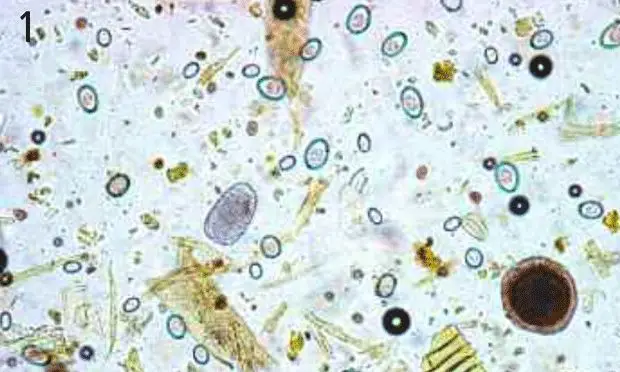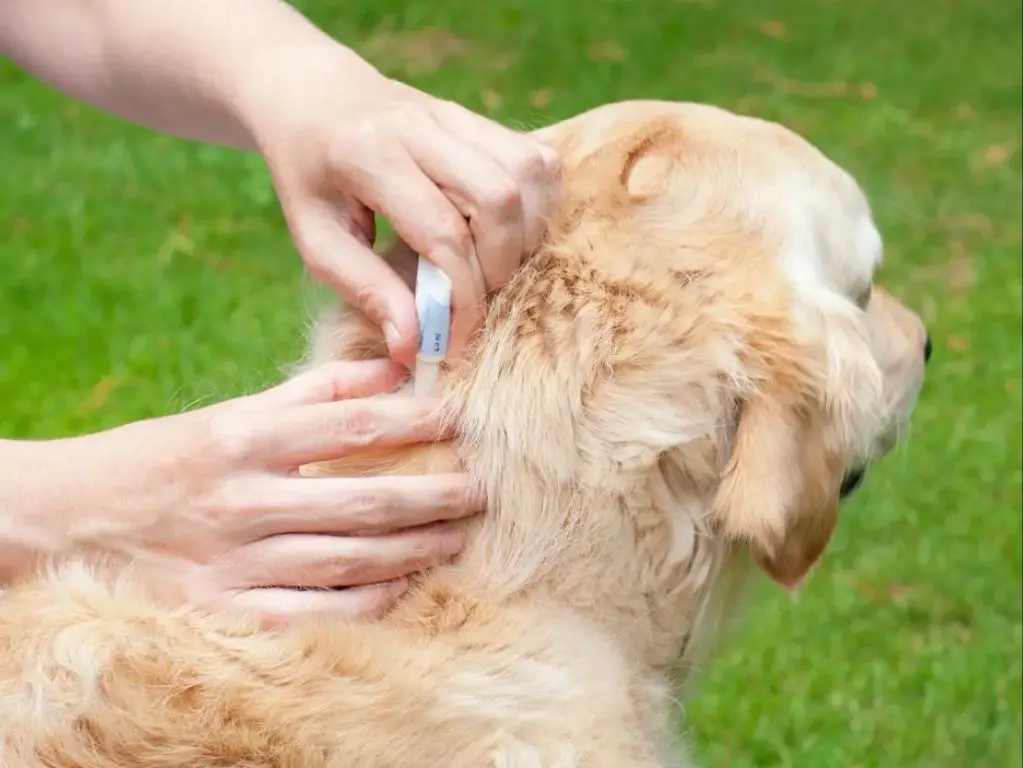Introduction
Intestinal worms are a common parasite found in dogs. When dog owners notice worms in their dog’s poop, it’s understandable to be concerned. However, most worms are treatable and preventing reinfection is possible with proper medication and cleaning.
Seeing worms in your dog’s poop can be alarming, but try not to panic. This article will cover the types of worms that infect dogs, how dogs get worms, symptoms, detection through fecal examination, treatment, prevention, risks, when to see the vet, and provide dog owners with a thorough understanding of intestinal worms in dogs.
Common Intestinal Worms in Dogs
There are four main types of intestinal worms that can be found in dog poop:
Roundworms
Roundworms are spaghetti-like worms that can grow up to 7 inches long. They live in the intestines and absorb nutrients meant for the dog. Roundworms are prolific egg layers and their eggs are easily spread through the feces of infected dogs. Puppies are often born with roundworms which they acquire in utero from their mother.
Tapeworms
Tapeworms are long, segmented worms that attach themselves to a dog’s intestines using hook-like mouthparts. As the tapeworm grows, individual segments containing eggs break off and pass in the dog’s feces. Tapeworm eggs can survive in the environment for long periods. Dogs get tapeworms by ingesting fleas or small mammals infected with tapeworm larvae.
Hookworms
Hookworms are thin worms that attach themselves to the intestinal wall and feed on your dog’s blood. Hookworm eggs are passed in the feces and larvae can infect other dogs if ingested. Hookworms are especially dangerous in young puppies and can cause life-threatening anemia from blood loss.
Whipworms
Whipworms are thinner at one end, giving them a whip-like shape. They burrow into the lining of the large intestine. Female whipworms lay thousands of eggs per day which are passed out in the feces. Infected dogs may only pass a few worms intermittently making them harder to detect on fecal exams.
How Dogs Get Worms
Dogs get worms primarily through ingesting parasite eggs or larvae in contaminated soil, food, or water. Many types of worms have a direct life cycle, meaning eggs passed in the feces can quickly hatch into larvae or develop into infective eggs that pets ingest by mouth. Here are some common ways dogs pick up intestinal worms:
- Ingesting eggs or larvae from contaminated soil, grass, feces, or environment
- Eating infected fleas, mice, birds or other prey (this allows tapeworm transmission)
- Drinking water contaminated with parasite eggs, such as from puddles or streams
- Eating feces or food contaminated with eggs or larvae
- Nursing from an infected mother dog (puppies are at risk)
Worm eggs and larvae are microscopic but can lurk in surprising places dogs access. Good sanitation and preventing coprophagia can help reduce exposure. Puppies under 6 months old tend to be most vulnerable as their immune systems are still developing.
Symptoms of Worms in Dogs
There are several symptoms that may indicate your dog has intestinal worms. Some of the most common symptoms include:

Diarrhea – Worms irritate the intestinal tract, causing inflammation and loose stools. Diarrhea from worms may come and go. You may see worms or eggs in your dog’s stool. Diarrhea can lead to dehydration if left untreated.
Vomiting – Some dogs vomit when they have a heavy worm burden. Roundworms sometimes get vomited up, which can look like spaghetti. Vomiting may be occasional or frequent.
Weight loss – Intestinal worms steal nutrients from your dog’s food. This can cause weight loss despite a normal appetite. Dogs may lose weight rapidly with a heavy worm infestation.
Dull coat – Worms can deprive your dog of essential nutrients, leading to a dull, dry coat. General unthriftiness and poor body condition may also be seen.
Detecting Worms in Poop
There are a few ways to detect the presence of worms in your dog’s poop:
Appearance
Examine your dog’s poop closely for any signs of worms. Keep an eye out for:
- Rice-like particles in or around the stool. These may be tapeworm segments.
- Worms that resemble spaghetti strands or noodles. These could be roundworms or whipworms.
- Worms that look like sesame seeds. These are likely hookworms.
- A bloody or mucus-like substance coating the stool. This may indicate worms damaging the intestines.
- Diarrhea or abnormal stool consistency.
Stool Sample Testing

The most accurate way to detect intestinal worms is through laboratory examination of your dog’s stool sample. There are tests that can identify worm eggs, larvae or adults. Your veterinarian will take a fecal sample and have it analyzed under a microscope to check for parasites. Stool tests should be performed 1-4 times per year based on your dog’s age, health and risk factors.
Treating Intestinal Worms
Treating intestinal worms in dogs typically involves administering dewormers or anti-parasitic medications. Here are some of the most common medications used:
- Fenbendazole – This broad-spectrum dewormer is effective against roundworms, hookworms, whipworms and some tapeworms. It is given orally and kills worms by blocking their ability to use glucose, causing them to die.
- Praziquantel – This medication is used to treat tapeworms. It causes the worm to dissolve by disrupting its calcium transport system.
- Pyrantel pamoate – This dewormer is effective against hookworms and roundworms. It works by paralyzing the worms’ muscles, causing them to detach from the intestinal wall and be passed in the feces.
- Ivermectin – This is a broad-spectrum dewormer that works against a variety of intestinal worms by paralyzing and killing them.
- Milbemycin oxime – This medication is used against hookworms, roundworms and whipworms. It works by disrupting worm neuromuscular transmission.
The specific medication used will depend on the type of worm present and veterinary recommendations. Most dewormers are administered orally, either in tablet form or liquid form. Some topical and injectable dewormers are also available.
Preventing Worms
There are a few key ways to help prevent your dog from getting worms:
Sanitation
Keeping your home and yard clean can reduce the spread of worms. Be sure to pick up your dog’s poop promptly, and dispose of it properly so worms eggs don’t have a chance to hatch and reinfect your dog. Keeping food and water bowls clean, washing bedding frequently, and minimizing your dog’s access to dirt and possible contaminated soil can also help.
Flea Control
Fleas can transmit tapeworm eggs and larvae to dogs, so effective flea control is imperative. Work with your vet to implement monthly flea prevention medication, treat your home and yard, wash bedding regularly, and check your dog’s coat for signs of fleas.

Deworming Schedule
Your vet will likely recommend regular deworming, often starting at 2 weeks old, repeating every 2 weeks until 12 weeks, then monthly until 6 months old. Adult dogs typically need deworming 1-4 times per year, especially if they hunt, board, or have fleas. Work with your vet to determine the optimal deworming schedule for your dog.
Risks of Worms
Intestinal worms can pose some serious health risks to dogs if left untreated. Some of the main risks include:
Malnutrition
Worms can rob the dog’s body of essential nutrients, resulting in protein deficiency, anemia, and other malnutrition issues. Roundworms are notorious for stealing nutrients from the dog’s intestinal tract.
Intestinal Blockages
A heavy worm burden can cause obstructions and blockages in the dog’s intestinal tract or airways. Roundworms in particular can cause blockages if they accumulate in large numbers.
Illness
Worms can transmit other parasites and pathogens to the dog. Some worms themselves can also migrate to other areas of the dog’s body, such as the lungs or heart, causing illness. Heartworm is one example that can be fatal if left untreated.
Due to these potential risks, it’s important to routinely check for worms and promptly treat any infections. Preventative medication is key to protecting dogs’ health.
When to See a Vet
In most cases, mild worm infections can be treated at home with over-the-counter dewormers. However, there are certain situations when you should take your dog to the vet:
Persistent symptoms: If your dog continues to show symptoms of a worm infection after completing a course of OTC medication, take them to the vet. Persistent symptoms may indicate an underlying health issue or a resistant infection requiring prescription medication.
Ineffective OTC meds: If you diligently administer OTC dewormers but continue to see worms in your dog’s poop, the medication may not be effective. Your vet can prescribe a stronger dewormer and help identify the specific type of worms to ensure complete elimination.
It’s important to consult your vet if home treatment fails. Left untreated, worms can cause malnutrition, intestinal blockages, and other potentially serious health problems in your dog. Don’t delay – schedule an appointment if OTC meds don’t resolve the issue.
Conclusion
Dogs can get several different types of intestinal worms, including roundworms, tapeworms, hookworms, and whipworms. These worms live in a dog’s digestive tract and can cause a variety of symptoms, like a pot-bellied appearance, vomiting, diarrhea, and a dull coat. While most adult dogs acquire some level of immunity, puppies are especially susceptible to worms.
One of the key ways to check for worms in dogs is by monitoring their poop. Tell-tale signs include visible worms or eggs, a dull or bloody appearance, mucus, changes in consistency, and vomiting. If you suspect your dog has worms, bring a fresh fecal sample to your veterinarian for testing.

Fortunately, there are many effective dewormers that can kill intestinal worms. Your vet will prescribe the appropriate medication based on the type of worm infection. You’ll also want to practice preventative care by keeping your dog on monthly heartworm medication and quarterly deworming. With proper treatment and prevention, worms don’t have to pose an ongoing threat to your dog’s health.
By familiarizing yourself with the most common dog worms, how they’re transmitted, and their symptoms, you can stay alert for potential issues. Monitoring your dog’s poop provides valuable clues into their gastrointestinal health. With vigilance and proactive veterinary care, you can keep your dog’s digestive tract free of worms.